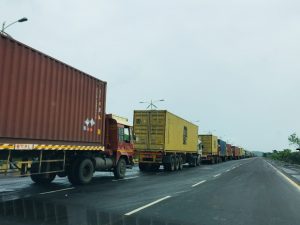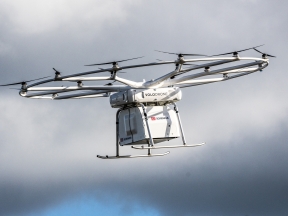CargoAi has marked another step forward with the rollout of its CargoMART Interline solution —its latest innovation aimed at fully digitising and automating interline cargo bookings between airlines, said Mark Drusch, Chief Officer Cargo, QR Cargo. The announcement comes as CargoAi celebrates three years of partnership with QR Cargo, a collaboration that continues to deepen as both companies push the boundaries of digital transformation in air freight. With the launch of the Interline module, QR Cargo can now streamline its digital operations giving customers faster and more efficient interline booking capabilities. CargoMART Interline enables airlines to instantly check and book interline capacity across multiple partner carriers in real time — eliminating the manual coordination typically needed across different time zones and reducing operational complexity., highlighted the strategic importance of the initiative, “Digitalisation remains a cornerstone of QR Cargo’s vision. Our continued collaboration with CargoAi and introduction of CargoMART Interline reinforces our commitment to innovation, enabling us to optimise interline partnerships and deliver a seamless and efficient digital booking experience for customers across an expanded global network,” Drusch added.
Read More »Raipur–Vizag corridor cuts gap by 130 km, boosts road freight
Andhra Pradesh is poised to become the biggest beneficiary of the Raipur–Visakhapatnam Economic Corridor, a major greenfield highway project costing ₹16,482 crore. The corridor will shorten the Raipur–Visakhapatnam route from 597 km to 465 km and is likely to be completed by December 2026. According to officials, the new highway will reduce travel time to Visakhapatnam Port from the current 12–15 hours to just five hours. This improvement will lower fuel use, cut transportation costs, boost movement of trucks, minerals, agricultural produce, and container cargo, thereby opening the door to substantial industrial, logistics and agricultural growth across Andhra Pradesh. For the state’s northern districts — Visakhapatnam, Anakapalle, Alluri Sitharama Raju district, and parts of Vizianagaram — the project promises enhanced connectivity to the industrial regions of Chhattisgarh and Odisha.
Read More »Delhivery ferries medicines via VTOL drone in Deoria, UP
Delhivery completed testing of its autonomous Vertical Take-off and Landing (VTOL) drone technology at Deoria, Uttar Pradesh. Delhivery drone, carried medicines and completed a pre-programmed 12 km flight path autonomously. The mission, which would normally take up to 40 minutes by road due to infrastructure challenges, was completed in 12 minutes, highlighting the potential of aerial logistics to transform last-mile delivery in India. The showcase was held in the presence of Shashank Mani, MP from Deoria. The drone was executed by Delhivery Robotics India, a subsidiary of Delhivery, which has designed and manufactured the Logistics Drone.
Read More »‘Agents may succeed in promoting their products export such as processed minerals, pharmaceuticals, chemicals, tea, steel to Russia’
Sunil Kohli, MD, Rahat Cargo said, “The ongoing efforts by the governments concerned to boost the India-Russia-China economic corridor may yield enhanced connectivity avenues such as the INSTC (International North-South Transport Corridor) and Eastern Maritime Corridor(EMC) thereby streamlining logistics with digital tracking, using local currencies of the respective countries followed by diversifying trade beyond energy namely pharmaceuticals, minerals for oil/coal. The coordinated corridor of economic understanding among the three countries may also address regulatory hurdles through focused agreements with a view to professionalise these Eurasian routes. The Indian freight forwarders may succeed in promoting their products export such as processed minerals, pharmaceuticals, chemicals, tea, and steel to Russia whereas liberalised imports from Russia may be witnessed comprising coal, oil, gas and fertilisers.”
Read More »‘The corridor will reduces transportation time & costs, boost Indian exports’
Gautham Raju, Air Freight Specialist said, ‘Taking India-Russia economic partnership to new heights is our common priority’ said PM Modi after talks with Putin. India-Russia-China economic corridor is poised to transform EXIM trade, and freight forwarding agents who adapt quickly will reap the advantages and benefits on core sectors. Agents can offer integrated logistics solutions, including air freight, sea freight, and land transportation. Digitalisation and infrastructure upgrades will streamline logistics processes, enhancing customer satisfaction. PM Modi also said after 23rd India–Russia Bilateral Summit that India and Russia are working towards early conclusion of a free trade agreement with Eurasian Economic Union. Putin said that we are looking at increasing annual bilateral trade volume to USD 100 billion, he said. Putin said Russia is also looking at expanding cooperation in the energy sector with New Delhi, adding his country is ready for uninterrupted shipments of fuel to India. This corridor, comprising the International North-South Transport Corridor (INSTC) and the Chennai-Vladivostok Maritime Corridor, reduces transportation time and costs, making Indian exports more competitive, benefiting industries like pharmaceuticals, electronics, and machinery.
Read More »‘The corridor will open new gateways for commodities & multimodal logistics’
Kunal Maheshwari, Chief Growth Officer, Softlink Global said, “The India–Russia–China economic corridor has the potential to reshape EXIM trade dynamics by creating shorter, cost-efficient routes and reducing transit dependency on traditional channels. This will enable smoother cargo movement, enhance regional connectivity, and open new gateways for commodities, manufacturing, and multimodal logistics. For freight forwarders and agents, it translates into increased business opportunities, diversified trade lanes, competitive pricing, and scope for value-added services.”
Read More »‘Persistent trust deficit, unresolved border issues between India, China must be resolved’
Balagopal Balachandran, National Head – Air Freight said, “While there is no formally established ‘India-Russia-China economic corridor yet, there is definitely renewed momentum around closer cooperation among the three countries. Russia India China (RIC) Troika was first conceptualised by Russia in the 1990s, a time when Russia was trying to find its place on the global stage following the collapse of the USSR. A potential trilateral corridor, if realized, would significantly boost EXIM trade and create new opportunities for trade agents by offering alternative, more direct trade routes and payment systems. We are already seeing encouraging signals. Diplomatic engagement in 2025 has led to several new agreements, and India and Russia have set an ambitious target of USD 100 billion in bilateral trade by 2030. These political signals increase the probability of concrete trade facilitation steps (e.g., tariff talks, rail/road/law harmonization, payment arrangements) that reduce friction and cost for exporters and importers. However, the realisation of a fully functional trilateral corridor remains constrained by geopolitical challenges, particularly the persistent trust deficit and unresolved border issues between India and China. Until these are addressed, progress is more likely through strengthened bilateral engagements and broader platforms like BRICS and the SCO, rather than a formal trilateral corridor.
Read More »‘Agents will benefit with lanes, higher volumes, more capacity‘
Dinesh Krishnan, Honorary Treasurer, ACAAI said, “The IRC corridor, if executed well, will be one of the most significant geopolitical and economic catalysts for Indian EXIM trade in the next decade. For air cargo agents, it brings new lanes, higher volumes, more capacity, and a shift toward value-added, specialised logistics—exactly the kinds of opportunities that transform industry players into global logistics powerhouses.
Read More »‘The corridor will strengthen supply chain resilience & open new trade lanes’
C K Govil, CMD, Activair Airfreight said, “The proposed India–Russia–China economic corridor has the potential to significantly accelerate EXIM trade by creating a faster, more cost-efficient and multimodal link between major manufacturing and consumption markets. By reducing transit times, improving rail–road–sea connectivity, and diversifying routes beyond traditional chokepoints, it will strengthen supply-chain resilience and open new trade lanes for high-value and time-sensitive cargo. For freight forwarders and cargo agents, the corridor promises increased cargo volumes, expanded cross-border logistics opportunities, and the ability to offer more competitive transit solutions. It will also spur demand for specialised services—multimodal documentation, value-added logistics, customs expertise, and digital track-and-trace—placing Indian agents at the centre of a rapidly evolving Eurasian trade ecosystem. In my view, this corridor could be a strategic game-changer, positioning India not only as a key transit hub but also as a pivotal logistics partner in the emerging tri-nation economic architecture.”
Read More »GOX grabs Emerging Terminal Operator Award at ICA 2025
GMR Airports Limited’s GMR Goa Air Cargo (GOX) at Manohar International Airport lifts ‘Emerging Integrated Freight Terminal Operator’ Award at the recent India Cargo Awards 2025. This recognition highlights GOX’s rise as a modern and efficient cargo hub in the region. Equipped with advanced handling infrastructure, technology-driven processes, and a focus on customer-centric operations, GOX has established itself as a key contributor to Goa’s growing air cargo ecosystem. The award underscores GMR’s commitment to enhancing cargo linkage, streamlining logistics, and supporting trade growth in one of India’s most promising emerging gateways.
Read More » Cargo Breaking News
Cargo Breaking News









